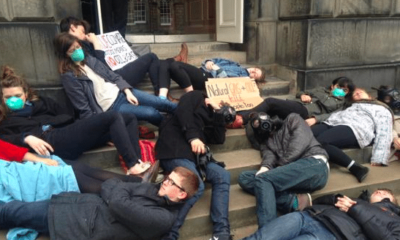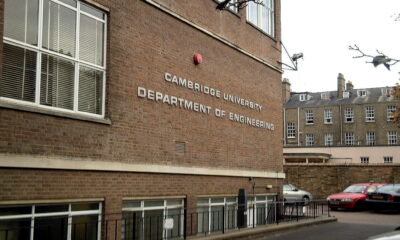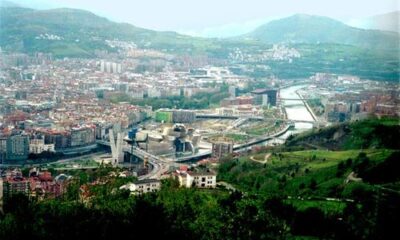

Energy
Engingeering Projects of the Future Unveiled Today
A shortlist of low carbon, future-proof engineering projects fit for the 21st Century and beyond have been revealed today by Scotland’s Climate Change Minister at the Edinburgh based Green Investment Bank.
Climate Change Minister Dr Aileen McLeod announced the three shortlisted projects which were selected after a rigorous process involving many experts and 1000s of members of the public, who were asked which of a longlist of ten possible projects they felt should be taken forward most urgently.
The year-long initiative by the Low Carbon Infrastructure Taskforce [3] set out to explore how Scotland’s proud engineering tradition could be harnessed to tackle fuel poverty, improve public health, create jobs and slash carbon emissions. It’s hoped the Scottish Government will now develop and take forward each of these strong infrastructure projects to help build a prosperous Scotland.
The shortlist includes:
City transport transformation. Adapting our cities for active travel and public transport: This project looks to re-engineer our cities to allow people live and travel in low-carbon ways- connecting public transport within and across cities, reducing air pollution from private vehicles and making it easier and safer to travel on foot or by bike. Examples of this type of project elsewhere even show that projects like this can boost local business and improve the local economy.
Urban district heating networks: Building Scandinavian-style heating into Scotland’s cities: This project would develop Scandinavian-style district heating networks in Scotland’s city centres to join up isolated “heat islands” and develop future-proofed heating networks, allowing homes and businesses to benefit from renewable sources of power, energy efficiency and reduced emissions.
Energy efficiency retrofit programme: Making all of Scotland’s buildings warm, healthy and affordable to heat: This project is about improving our homes, businesses and public sector buildings to be more energy efficient, reducing fuel poverty, improving health and ensuring long-term financial savings. Insulation, lighting upgrades and boiler replacements could help the 70% of buildings that will still be in use in 2050 be more ‘future-proof’.
Dr Aileen McLeod, Climate Change Minister said “Scotland is on track to meet and exceed our world-leading target of a 42 per cent reduction in greenhouse gas emissions by 2020. We have one of the most comprehensive packages of low carbon action in the world which sets the benchmark the international community needs to match in the years ahead if we are to stand a good chance of limiting global warming to well below two degrees Celsius as called for by the Paris Agreement.
“I am very impressed by the high quality of these short-listed projects that very much reflect the current policy focus of the Scottish Government, in particular with the designation of energy efficiency as an infrastructure priority and the expanding focus on low carbon infrastructure highlighted in the Infrastructure Investment Plan. We must now all of us – including businesses, industry and individuals – work together to achieve our common ambition of tackling climate change and making the transition to a low carbon economy.”
Sara Thiam, Chair of Low Carbon Infrastructure Taskforce said “This has been an exciting project and a privilege to work with so many people as passionate about Scotland’s infrastructure as I am. The quality of the projects put forward was impressive in ingenuity and diversity including transforming transport in our cities to allow for more active travel and public transport, improving the energy efficiency of our homes and offices nation-wide and new ways of sourcing clean, cheap heating through installing district heating networks. We’ve engaged with experts and the public and found there is ready support for these projects. I hope the Scottish Government will consider our shortlist and take it forward to ensure we grasp the benefits to our economy, environment and quality of life for the people of Scotland.”
David Miller, former Mayor of Toronto (2003-2010), under whose leadership Toronto became widely admired internationally for its environmental leadership, economic strength and social integration, sent a video message of support to the event. Miller, currently CEO of WWF-Canada, said:
“In Toronto we focused on three key areas. Transportation, including active travel like walking and cycling which made the city a better place to live, energy retrofit in buildings, which are a significant job creator, and clean energy generation. As a result of our efforts the city was emitting 15 per cent percent less greenhouse gases by 2012 based on 1990 levels. By starting with the right environmental values we built a better, more liveable, socially inclusive city that created jobs.
“Of course, there were challenges of money and political will, but we found that the people of Toronto were with us. I know that Scotland and its people have tremendous ideas, and I have no doubt that the Scottish Government will implement the best ones. I am confident of your success.”


 Environment12 months ago
Environment12 months agoAre Polymer Banknotes: an Eco-Friendly Trend or a Groundswell?

 Features11 months ago
Features11 months agoEco-Friendly Cryptocurrencies: Sustainable Investment Choices

 Energy11 months ago
Energy11 months agoThe Growing Role of Solar Panels in Ireland’s Energy Future

 Energy12 months ago
Energy12 months agoHow Renewable Energy Can Help Combat Climate Change, According to Indra Energy


























